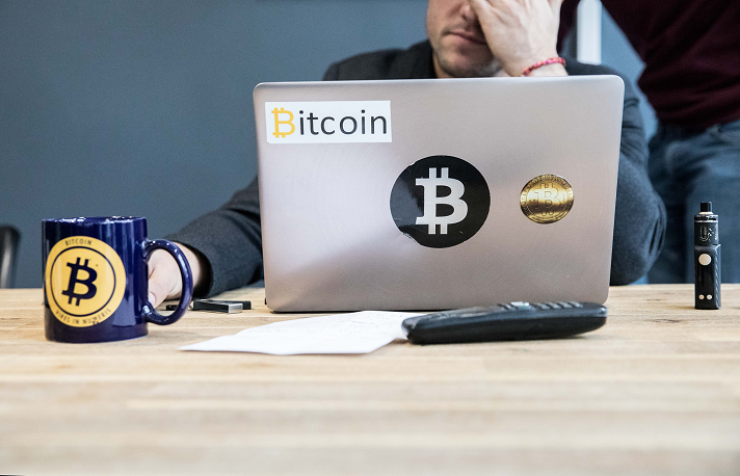This week bitcoin roared to new heights, took a steep dive and then leveled off — all the while grabbing major headlines and prompting a radio gabfest coast to coast. But it’s the evolving conversation among mainstream financial institutions — which may have accelerated just a bit in recent days— that bears close watching.
Bitcoin got a Wall Street endorsement of sorts on Wednesday when Nasdaq said it plans to introduce
News that Nasdaq will begin supporting bitcoin futures is “a clear message that the traditional parts of the financial services industry are embracing digital currencies,” said Richard Levin, chair of the financial services technology and regulation practice at the law firm Polsinelli PC.

“You look at the fact that the Chicago Mercantile Exchange and Nasdaq — two of the leading exchanges — are embracing financial products connected to a digital asset," Levin said. "They aren’t charging into this cavalierly. They had discussions with their regulators. And many [institutional investors] are taking a look at this digital asset class and asking, is this a new asset we can trade? Just like the development of derivatives, some may feel this is a new area they can make money trading in.”
Still, Levin said, regulators are likely to be concerned with the rise in popularity in bitcoin among individual retail investors who may not be as sophisticated and aware of bitcoin’s propensity for fluctuations. Indeed,
“I think they’re worried that retail investors deemed not sophisticated enough might get burned,” he said.
But does the weight of having established names trading in bitcoin instruments mean the banking industry at large will begin to embrace it? Not exactly, but they may be less hostile and try to understand it better, experts said.
Goldman Sachs CEO Lloyd Blankfein said
“Something that moves up and down 20% in a day doesn’t feel like a currency, doesn’t feel like a store of value,” Blankfein said Thursday in an interview on Bloomberg Television.
That assessment, though cool, was less dismissive than when JPMorgan Chase CEO Jamie Dimon

Many banks may avoid bitcoin until more regulatory clarity is provided and the price stabilizes.
“It’s very difficult for banks themselves to benefit from bitcoin,” said Ben Jessel, managing principal at the consulting firm Capco. “There’s a lot of concern around its overall fundamentals. One would hope the advent of a futures market now will provide us with an idea of the future price of bitcoin and perhaps take out some of the speculative bubble element.”
The most well-known cryptocurrency experienced perhaps
In general, the price of bitcoin has surged over 900% in 2017, largely due to much increased interest from retail and institutional investors in the cryptocurrency, which was once
That said, bitcoin is now attracting both individual and institutional investors in large numbers, said Maximilian von Wallenberg, co-founder of Cryptonaut, a cryptocurrency trading platform.
“Every day at the moment only 1 million bitcoin are actively traded,” he said. “But by now there are millions of people who want to get into the market. … In addition, we have institutional money pouring in.”
'The advent of a futures market now will provide us with an idea of the future price of bitcoin and perhaps take out some of the speculative bubble element.'
Some believe bitcoin — or at least the technology behind it — will have the greatest impact in banking by revolutionizing an inefficient cross-border payments system.
“I think the biggest possibility will come in cross-border payments,” said Jessel. “The correspondent banking network we have now takes three days" to complete a payment.
“For cross-border payments, there is nothing better than cryptocurrency,” said William Quigley, managing director of Clearstone Venture Partners and CEO of the Worldwide Asset Exchange, a virtual marketplace. “More people are beginning to understand that fact, and it is getting reflected in the price for bitcoin.”
But regardless of its eventual function in the financial services industry, some say banks that dismiss bitcoin altogether do so at their own peril.
“This is a runaway train — no one is closing it down now,” said David Tawil, a director at Maglan Capital and former investment banker at Credit Suisse. “If any financial services professional is not taking notice and educating themselves on bitcoin and cryptocurrency, they are doing themselves a big disservice.”
Once the “nefarious elements” associated with cryptocurrency can be minimized, the basic notion of a universal digital currency “is extremely compelling,” Tawil said, especially for those living in countries where there is geopolitical discord and a lack of trust in the government being able to maintain an economy.
“Regulators need to get all over this as fast as possible and start figuring out a way to legitimize it,” he said.





